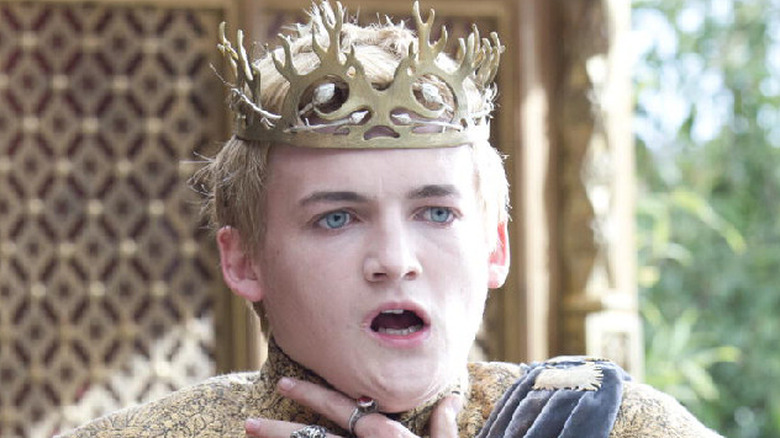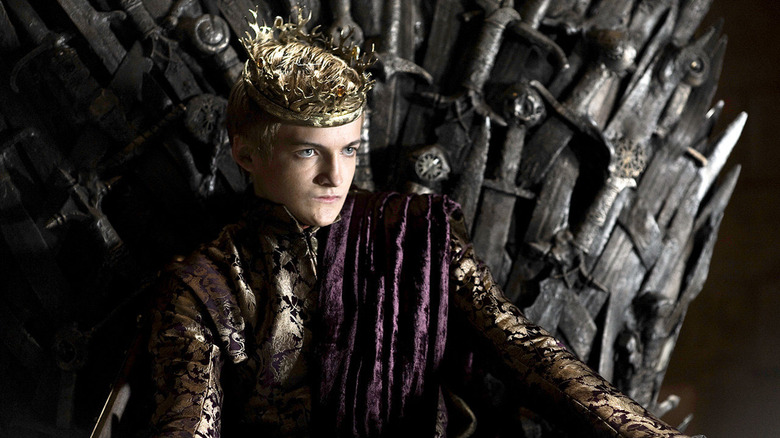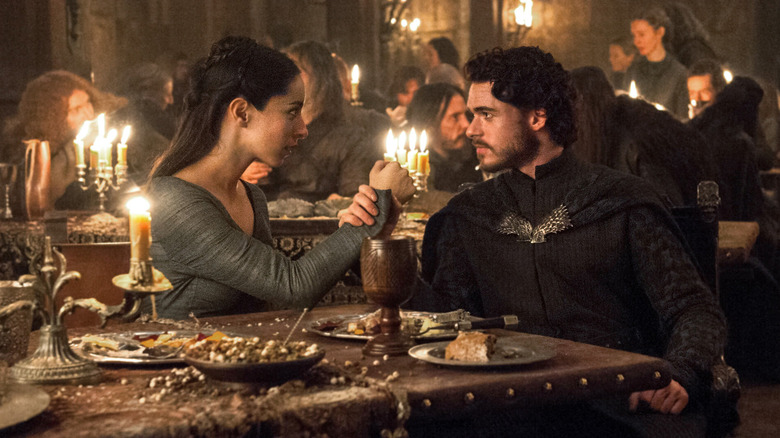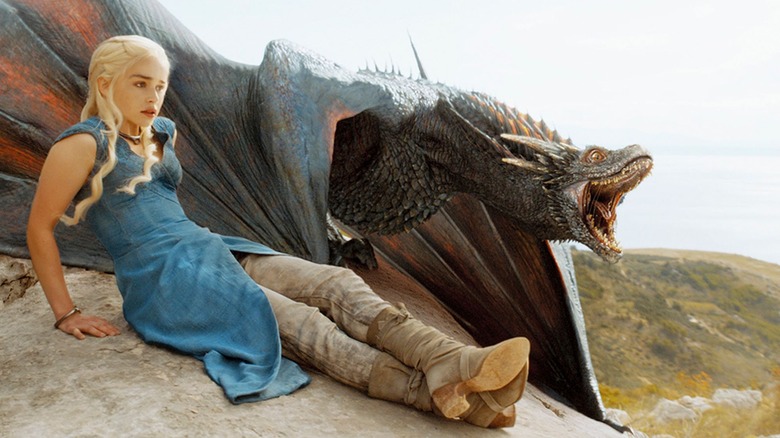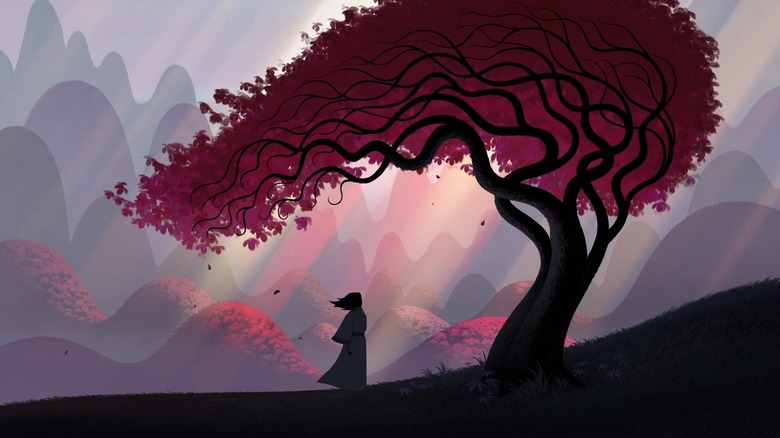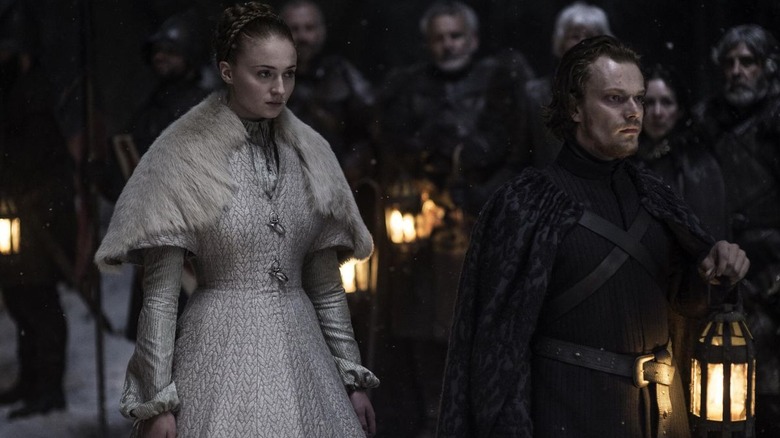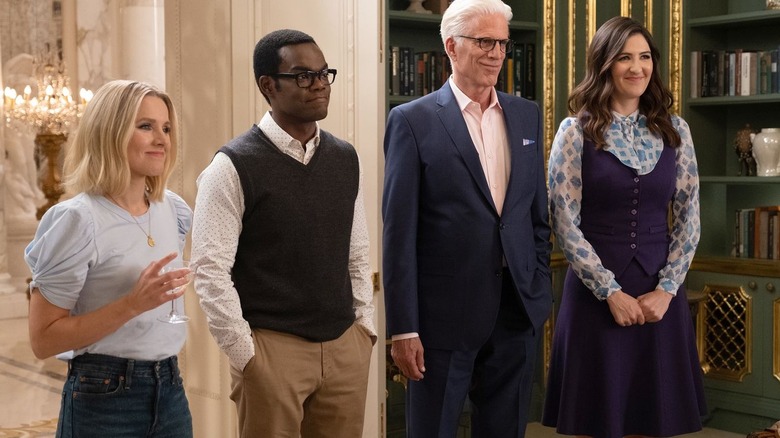The Only 7 Near-Perfect Fantasy TV Seasons According To Metacritic
Fantasy can be a tricky genre to get right on television. Successful series contain sprawling, imaginative worlds, as intricate and believable as the reality we all know and experience. Get it right, and viewers fall in love. Get it wrong, and viewers lose interest faster than Ned Stark loses his head.
Fortunately, success is possible: Popular fantasy shows like HBO's "Game Of Thrones" and Netflix's "The Witcher" prove that the genre doesn't have to be confined to lengthy novels or the silver screen. In fact, television offers unique opportunities to expand fictional worlds in thrilling new ways. Consider how "The Witcher" plays with timelines, or the impact of a well-placed cliffhanger. The best fantasy series even manage to say something meaningful about the human experience.
According to Metacritic, these fantasy TV seasons are the pinnacle of the genre. Commended for their complex character arcs, interwoven narratives, and impressive visuals, these seasons are so good, in fact, that their "Metascores" are all 90 or above. Which seasons of what shows make the cut? Join us as we explore the peak of the genre with these near-perfect fantasy TV seasons, as judged by Metacritic.
Game Of Thrones, Season 2
Before its controversial finale aired in 2019, "Game Of Thrones" was television gold, and Season 2 encapsulates why. The Stark siblings are scattered: Robb (Richard Madden) is out for vengeance for his late father Eddard Stark (Sean Bean), Bran (Isaac Hempstead Wright) is ensconced in Winterfell, Sansa (Sophie Turner) is trapped in King's Landing, Arya Stark (Maisie Williams) is traveling throughout Westeros, and their half-brother, Jon Snow (Kit Harington), is beyond the Wall. In Essos, Daenerys Targaryen (Emilia Clarke) takes up residence in the city of Qarth — and soon discovers its dangers. War is omnipresent, and no one is safe.
The highest rated episode of Season 2 is the penultimate episode, "Blackwater," in which Stannis (Stephen Dillane), brother of the fallen King Robert, storms the city in an attempt to reclaim the Iron Throne from the Lannisters. Episode 2, "The Night Lands," holds the lowest score of the season. Overall, Season 2 is praised by critics for advancing every character's arc and expanding the world of the series: The New York Post declared "the 'Game' is worth it," while Entertainment Weekly praised "Game Of Thrones" for its "sprawling, noncontemporary narratives; it's another level of pop culture wizardry to make such storytelling seem so vivid, so vital, and just plain fun."
Game Of Thrones, Season 3
4.4 million viewers tuned in to watch Season 3 of "Game of Thrones" debut. Forced to flee Winterfell, Bran Stark and his brother Rickon (Art Parkinson) part ways this season. Their older brother doesn't fare much better: Robb's marriage to Talisa (Oona Chaplin) results in the infamous Red Wedding. In King's Landing, the Tyrells cement their power while Tyrion clashes with his father, Tywin (Charles Dance), when the latter resumes his role as Hand of the King. Elsewhere in Westeros, Jaime Lannister (Nikolaj Coster-Waldau) loses a hand and gains a new friendship with Brienne of Tarth (Gwendoline Christie), while Jon Snow falls in love with the wildling Ygritte (Rose Leslie). Meanwhile, in Essos, Daenerys Targaryen gains an army of Unsullied and frees the slaves of Astapor and Yunkai.
As with Season 2, the penultimate episode takes the top spot. "The Rains of Castamere," otherwise known as the Red Wedding episode, deals another devastating blow to House Stark as Robb, his pregnant wife Talisa, and his mother Catelyn (Michelle Fairley) are betrayed and butchered by the Freys. The lowest-rated episode is Episode 7, "The Bear and the Maiden Fair." Critics praised Season 3 for braiding multiple character arcs into an intricate story spanning Westeros, Essos, and beyond. The Washington Post acknowledged the series had "achieved zeitgeist status" with this acclaimed season.
The Expanse, Season 4
"The Expanse" explores a world in which humanity has colonized the Solar System. Earth is ruled by the United Nations of Earth and Luna, the Martian Congressional Republic occupies Mars, and a group from the asteroid belt and the moons of Jupiter and Saturn form the Outer Planets Alliance. The repercussions of war and overpopulation are the focus here, as a Cold War-esque situation seizes the Solar System.
Season 1 introduces viewers to a number of protagonists, including Joe Miller/The Investigator, a police detective on Ceres played by Thomas Jane. Other main characters include James Holden (Steven Strait), an executive officer from Earth, as well as UN officer Chrisjen Avasarala (Shohreh Aghdashloo) and Belter engineer Naomi Nagata (Dominique Tipper). Amazon Prime Video picked up "The Expanse" after it was cancelled by Syfy in May 2018. Season 4 sees humanity trying to reach other galactic systems as refugees from the Belt and Earth try to access the Ring.
Critics celebrated Season 4 for exploring how the conflict gripping the Solar System unfolds. IndieWire praised "the ways that the allegorical nature of the show can reach back into our own world." TV Guide commented that Season 4 is driven by "complex character dynamics," and "throws a lot of balls into the air ... [and] juggles them all impressively."
Game Of Thrones, Season 4
Season 4 of "Game of Thrones" explores the aftermath of the Red Wedding — and surprisingly enough, it isn't smooth sailing after all for House Lannister. Joffrey is poisoned at his wedding feast, and Tyrion is blamed for the murder. King's Landing is further stirred up by the arrival of Oberyn Martell (Pedro Pascal). Sansa flees to the Vale with Petyr "Littlefinger" Baelish (Aiden Gillan), where she transforms into Darth Sansa after Littlefinger kills her aunt, Lysa Arryn (Kate Dickie). Elsewhere, Arya gains another unlikable travel companion in the Hound (Rory McCann). At the Wall, Jon Snow proves to be a secret badass when he leads the Night's Watch defense against the invading wildlings. Daenerys Targaryen's conquest of Slaver's Bay falters as she stalls in Meereen. The season concludes with another surprising death and a heavy blow for House Lannister when Tyrion kills his father before fleeing to Essos.
Two episodes take the top spot: "The Mountain And The Viper," featuring Tyrion's trial and a bloody clash between Oberyn and Ser Gregor Clegane, and "The Children," the season finale, which sees Bran reach the Three-Eyed Raven, Stannis become relevant again by saving Jon from the wildlings, and the Hound and Brienne come to blows. The Wrap called Season 4 "a gorgeous spectacle," praising "Game Of Thrones" for its "vast, believable world."
Samurai Jack, Season 5
"Samurai Jack” ended abruptly in 2004. 13 years later, Season 5 premiered on Adult Swim, bringing the long-awaited conclusion to Jack's story.
Jack (Phil LaMarr), a young Japanese prince, is given a magical katana to defeat the evil Aku (Mako/Greg Baldwin). During their battle, Aku flings Jack through a portal in time into a dystopian future, "where [his] evil is law." Season 5 is set 50 years later, where an ageless and suicidal Jack is plagued by the memories of the people he has lost. Aku isn't doing well either, having tired of his never-ending war with Jack. A new enemy has risen, however: Seven assassin sisters known as the Daughters of Aku. Despite it all, Jack becomes close to Ashi, the eldest. A tearful conclusion sees Jack finally return to his own time, yet also incur a terrible loss.
The Los Angeles Times praised the cartoon's vibrant visuals as "even richer than before ... It makes 'Samurai Jack' endlessly rewatchable: Every picture tells a story." Other critics commended the series for picking up the story again in a more mature setting, yet still retaining what made it so great in the first place. Vulture called the series "the most aesthetically daring show on TV," likening its indescribable qualities to "hearing Prince's 'Purple Rain' soundtrack for the first time."
Game Of Thrones, Season 5
Season 5 sees "Game of Thrones" continue its winning streak. Cersei assumes power in King's Landing, only for her schemes to blow up in her face. Arya Stark arrives in Braavos to train with the Faceless Men, while her sister Sansa suffers a marriage to Ramsay Bolton (Iwan Rheon). Daenerys finally leaves Meereen on the back of a dragon, after much consternation. Beyond the Wall, the Night King's army descends on Hardhome. As if that's not enough for poor Jon Snow, the new Lord Commander, to deal with, he has a creepy encounter with Melisandre, and (temporarily) dies. What is "Game Of Thrones" without at least one major character death per season?
The penultimate episode, "Hardhome," holds the highest rating: Viewers and critics were impressed by the icy massacre, culminating in a foreboding stare-down between Jon Snow and the Night King. Season 5 wasn't without controversy, though. Sansa's wedding to Ramsay in Episode 6, "Unbowed, Unbent, Unbroken," drew the lowest score of the season. Many viewers criticized its depiction of Sansa's wedding night for its sexual violence, particularly as this deviates from Sansa's story in the books. Entertainment Weekly praised Season 5 for "finally [bringing] people (and story lines) together," though it criticized the Sand Snakes as "closer to B-movie bad girls than warriors."
The Good Place, Season 3
Season 3 of "The Good Place" topples "Game Of Thrones" and "Samurai Jack" to take Metacritic's highest-rated position. "The Good Place" begins when the morally ambiguous Eleanor Shellstrop (Kristen Bell) meets an untimely end. In the afterlife, she gets to know Chidi Anagonye (William Jackson Harper), Tahani Al-Jamil (Jameela Jamil), and Jason Mendoza (Manny Jacinto). In Season 3, our heroes find themselves back on Earth to prove that humans can develop better morals with foresight and guidance. Philosophy and ethics are seriously explored, as they are in earlier seasons, with inspiration drawn from prominent figures like Aristotle and T.M. Scanlon. Chidi, who was an ethics professor in life, often gives voice to these theories throughout the series. The end of Season 3 puts these ideas into practice when the group designs their own Good Place to test whether or not humans can become better people with the right support.
This acclaimed season is the most near-perfect fantasy season of all, though it's worth noting that its user score falls short of what Season 4 of "Game of Thrones" achieves. IndieWire praised Season 3 of "The Good Place" for its ability to "bring the same blend of the philosophical and the fantastical back to [a] more recognizable sitcom setting," as well as continuing to explore its central theme: "That ongoing human connection and understanding is not only possible, but necessary."
